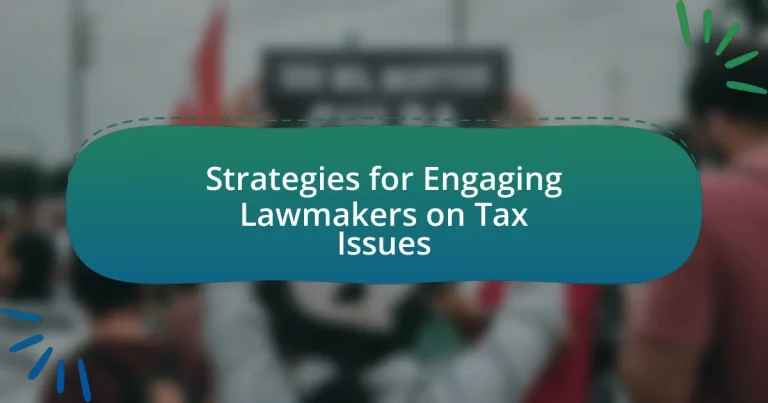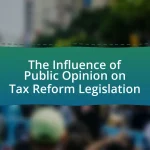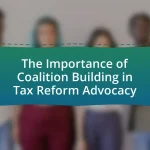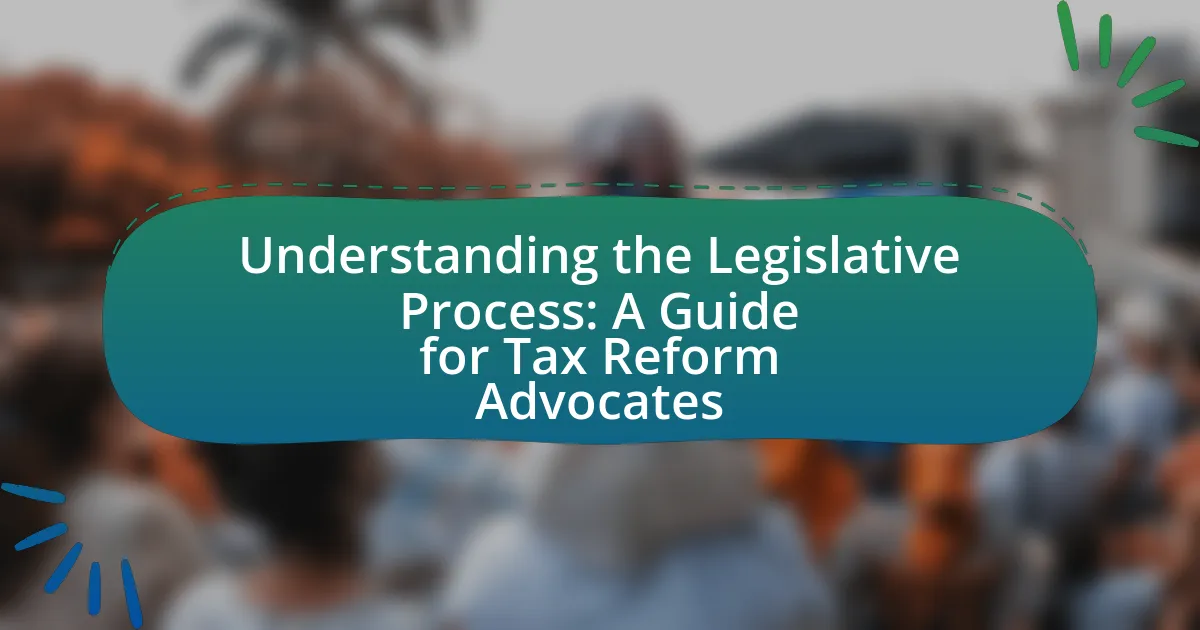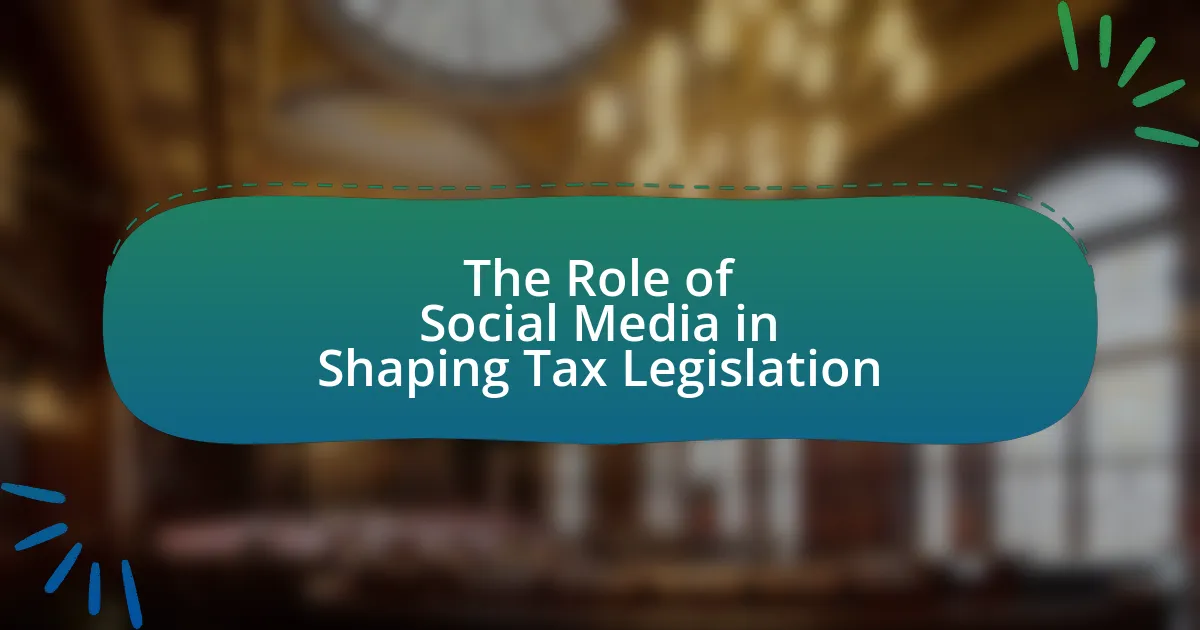The article focuses on strategies for engaging lawmakers on tax issues, emphasizing the importance of building relationships, providing clear data, and mobilizing constituents. It outlines methods for identifying the right lawmakers to engage, criteria for selection, and the significance of understanding lawmakers’ backgrounds to tailor advocacy efforts. Additionally, the article discusses effective communication techniques, the role of personal stories, and the challenges advocates face, including misinformation and competing interests. It concludes with best practices for ongoing engagement and the tools available to support continuous advocacy efforts in the realm of tax policy.
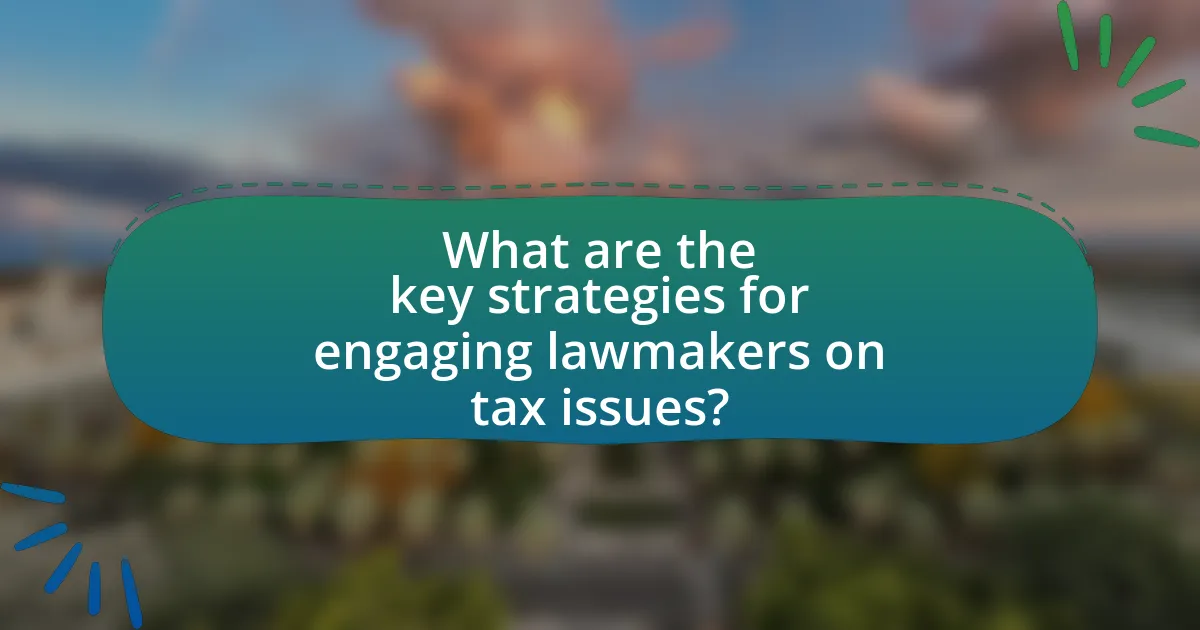
What are the key strategies for engaging lawmakers on tax issues?
Key strategies for engaging lawmakers on tax issues include building relationships, providing clear data, and mobilizing constituents. Establishing personal connections with lawmakers fosters trust and facilitates open communication. Presenting clear, relevant data, such as economic impact studies or tax revenue projections, helps lawmakers understand the implications of tax policies. Mobilizing constituents to express their views can amplify the message and demonstrate public support, making lawmakers more likely to consider the proposed tax issues. These strategies are effective as they align with lawmakers’ interests in representing their constituents and making informed decisions.
How can stakeholders identify the right lawmakers to engage?
Stakeholders can identify the right lawmakers to engage by analyzing lawmakers’ committee assignments, voting records, and public statements on tax issues. Lawmakers who serve on relevant committees, such as finance or taxation, typically have more influence over tax legislation. Additionally, reviewing their voting history on tax-related bills provides insight into their positions and priorities. For example, lawmakers who consistently support tax reforms aligned with stakeholders’ interests are more likely to be receptive to engagement efforts. Furthermore, stakeholders can utilize tools like the National Conference of State Legislatures or the Congressional Research Service to access detailed profiles of lawmakers, enhancing their ability to make informed decisions about whom to approach.
What criteria should be used to select lawmakers for engagement?
To select lawmakers for engagement, prioritize their committee assignments, voting records, and public statements on tax issues. Lawmakers who serve on relevant committees, such as finance or taxation, have direct influence over tax legislation. Additionally, analyzing their voting history reveals their stance on tax-related matters, indicating their likelihood of supporting or opposing specific initiatives. Public statements and engagement with constituents on tax issues further demonstrate their commitment and responsiveness to community concerns. These criteria ensure that engagement efforts are directed towards lawmakers who are most likely to impact tax policy effectively.
How does understanding a lawmaker’s background influence engagement strategies?
Understanding a lawmaker’s background significantly influences engagement strategies by allowing advocates to tailor their messaging and approach to align with the lawmaker’s values, interests, and constituents’ needs. For instance, a lawmaker with a background in business may prioritize economic growth and job creation, prompting advocates to emphasize tax policies that stimulate the economy. Additionally, lawmakers from diverse demographic backgrounds may have unique perspectives on tax equity, leading to strategies that highlight social justice in tax reform discussions. Research indicates that personalized engagement, which considers a lawmaker’s history and priorities, increases the likelihood of successful advocacy efforts, as it fosters a connection and demonstrates respect for the lawmaker’s experiences and constituents.
What methods can be employed to effectively communicate tax issues to lawmakers?
To effectively communicate tax issues to lawmakers, stakeholders can utilize data-driven presentations, direct advocacy, and coalition-building. Data-driven presentations provide lawmakers with clear, quantifiable evidence of the impact of tax policies, such as statistics on revenue generation or economic growth, which can influence decision-making. Direct advocacy involves personal meetings or testimonies that allow stakeholders to articulate their concerns and recommendations, fostering a personal connection that can enhance understanding. Coalition-building, where multiple organizations unite to present a unified stance on tax issues, amplifies the message and demonstrates widespread support or concern, making it harder for lawmakers to ignore the collective voice. These methods have been shown to increase the likelihood of lawmakers addressing specific tax issues effectively.
How can data and research be utilized to support tax issue arguments?
Data and research can be utilized to support tax issue arguments by providing empirical evidence that demonstrates the impact of tax policies on economic outcomes. For instance, studies such as the “Tax Policy and Economic Growth” report by the Congressional Budget Office illustrate how changes in tax rates can influence investment and job creation. By presenting statistical analyses, such as the correlation between tax incentives and business expansion, advocates can effectively argue for or against specific tax measures. Furthermore, data from reputable sources, like the Internal Revenue Service, can highlight trends in tax revenue and compliance, reinforcing arguments about the necessity or effectiveness of proposed tax reforms.
What role do personal stories play in influencing lawmakers’ perspectives on tax issues?
Personal stories significantly influence lawmakers’ perspectives on tax issues by humanizing complex policy debates and illustrating the real-world impact of tax legislation. When constituents share their experiences, lawmakers can better understand the consequences of tax policies on individuals and families, making the issues more relatable and urgent. Research indicates that narratives can evoke emotional responses, which are often more persuasive than statistics alone; for example, a study by the FrameWorks Institute found that personal stories can shift public opinion and policy priorities by connecting abstract concepts to tangible human experiences. This emotional engagement can lead lawmakers to prioritize tax reforms that address the needs and concerns of their constituents, ultimately shaping legislative outcomes.
Why is building relationships with lawmakers important for tax advocacy?
Building relationships with lawmakers is crucial for tax advocacy because it facilitates effective communication and influence over tax policy decisions. When advocates establish trust and rapport with legislators, they can more effectively present their perspectives, share relevant data, and mobilize support for tax reforms. Research indicates that lawmakers are more likely to consider the viewpoints of constituents and stakeholders with whom they have established connections, leading to more favorable outcomes for tax advocacy efforts.
What are the best practices for establishing rapport with lawmakers?
The best practices for establishing rapport with lawmakers include building personal relationships, demonstrating knowledge of relevant issues, and maintaining consistent communication. Building personal relationships can be achieved by attending community events and engaging in informal conversations, which helps lawmakers see advocates as approachable and relatable. Demonstrating knowledge of relevant issues involves being well-informed about tax policies and their implications, allowing advocates to provide valuable insights and solutions. Maintaining consistent communication ensures that lawmakers are kept updated on important developments and perspectives, fostering trust and collaboration. These practices are supported by research indicating that personal connections and informed dialogue significantly enhance advocacy effectiveness in legislative contexts.
How can ongoing communication enhance relationships with lawmakers?
Ongoing communication enhances relationships with lawmakers by fostering trust and ensuring that lawmakers are informed about constituents’ needs and concerns. Regular interactions, such as meetings, emails, or phone calls, allow lawmakers to understand the perspectives of their constituents, which can lead to more informed decision-making. For instance, a study by the National Conference of State Legislatures found that lawmakers who engage frequently with their constituents are more likely to support policies that reflect their constituents’ interests. This consistent dialogue not only builds rapport but also positions constituents as reliable sources of information, ultimately influencing legislative outcomes.
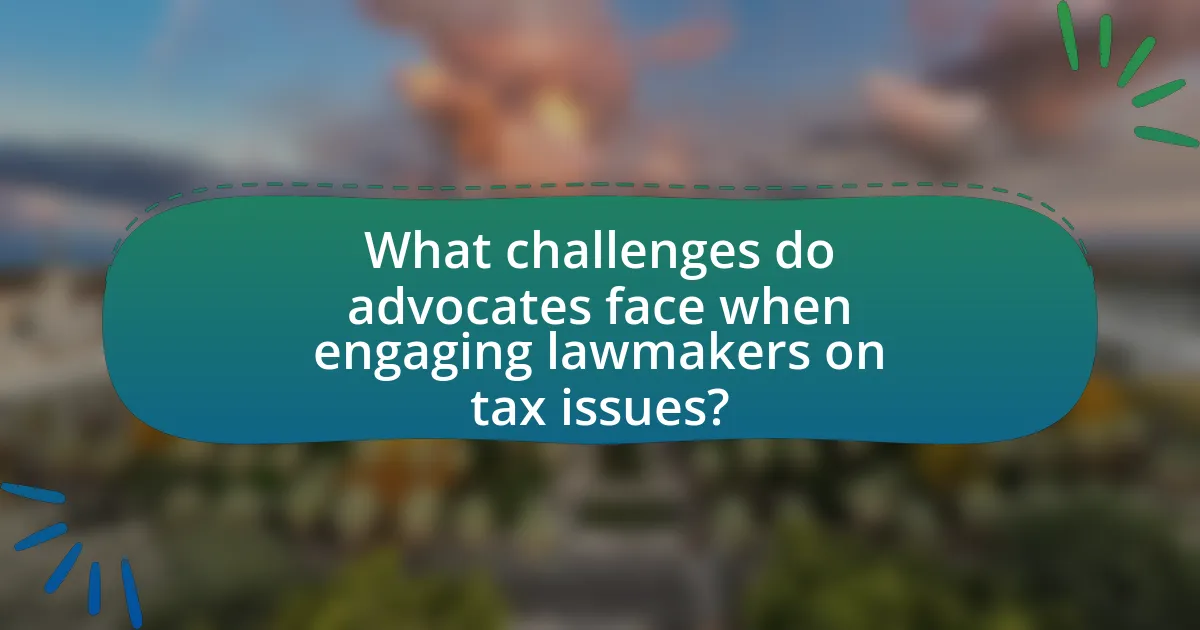
What challenges do advocates face when engaging lawmakers on tax issues?
Advocates face significant challenges when engaging lawmakers on tax issues, primarily due to the complexity of tax legislation and the competing interests of various stakeholders. The intricate nature of tax codes often makes it difficult for advocates to convey their messages clearly and effectively, leading to misunderstandings or misinterpretations of their positions. Additionally, lawmakers are frequently influenced by lobbyists representing powerful corporate interests, which can overshadow the voices of advocates representing public or community concerns. According to a report by the Center for Responsive Politics, over $3 billion was spent on lobbying in 2020 alone, illustrating the substantial resources that opposing interests can leverage against advocates. Furthermore, advocates may struggle with limited access to lawmakers, as many legislators prioritize relationships with established lobbyists or organizations, making it challenging for grassroots advocates to gain traction. These factors collectively hinder the ability of advocates to influence tax policy effectively.
How can advocates overcome resistance from lawmakers?
Advocates can overcome resistance from lawmakers by building strong relationships and providing data-driven evidence to support their positions. Establishing trust through consistent communication and collaboration allows advocates to better understand lawmakers’ concerns and priorities. For instance, presenting research that demonstrates the economic benefits of proposed tax reforms can effectively address skepticism. A study by the Tax Policy Center found that targeted tax incentives can lead to job creation and increased revenue, which can resonate with lawmakers focused on economic growth. By aligning their proposals with lawmakers’ goals and using credible data, advocates can reduce resistance and foster support for tax-related initiatives.
What strategies can be used to address lawmakers’ concerns about tax proposals?
To address lawmakers’ concerns about tax proposals, stakeholders can employ strategies such as providing comprehensive data analysis, engaging in transparent communication, and fostering bipartisan dialogue. Comprehensive data analysis helps lawmakers understand the economic impact of tax proposals, as evidenced by studies showing that informed decision-making leads to more favorable legislative outcomes. Transparent communication builds trust and allows for the clarification of misconceptions, which is crucial in addressing concerns. Additionally, fostering bipartisan dialogue encourages collaboration and can lead to more acceptable tax solutions, as historical examples demonstrate that bipartisan support often results in successful tax legislation.
How can advocates effectively counter misinformation regarding tax issues?
Advocates can effectively counter misinformation regarding tax issues by providing accurate, evidence-based information and engaging in transparent communication. This involves utilizing credible sources such as government reports, academic studies, and expert opinions to clarify misconceptions. For instance, the IRS publishes annual statistics on tax compliance that can be referenced to debunk myths about tax evasion rates. Additionally, advocates can leverage social media platforms to disseminate factual information quickly and engage directly with the public, correcting false narratives in real-time. By fostering open dialogues with lawmakers and stakeholders, advocates can ensure that accurate information is prioritized in policy discussions, thereby reducing the impact of misinformation on tax-related decisions.
What are the potential consequences of failing to engage lawmakers on tax issues?
Failing to engage lawmakers on tax issues can lead to unfavorable legislation and policies that do not reflect the interests of constituents. Without active participation, lawmakers may lack critical insights into the economic impacts of tax proposals, resulting in decisions that could increase tax burdens or create inequities. Historical examples, such as the Tax Cuts and Jobs Act of 2017, illustrate how insufficient stakeholder engagement can lead to significant tax reforms that favor certain groups over others, ultimately affecting economic growth and public trust in government.
How can lack of engagement impact tax policy outcomes?
Lack of engagement can significantly hinder tax policy outcomes by reducing the effectiveness of stakeholder input and limiting the responsiveness of lawmakers to public needs. When citizens, businesses, and advocacy groups do not actively participate in the tax policy process, lawmakers may lack critical insights into the economic realities and social implications of proposed tax measures. This disconnect can lead to policies that do not reflect the priorities or challenges faced by the community, resulting in ineffective or inequitable tax systems. For instance, research by the Center on Budget and Policy Priorities indicates that robust public engagement can lead to more equitable tax policies, as it ensures diverse perspectives are considered in decision-making.
What risks do stakeholders face if they do not advocate for their tax interests?
Stakeholders face significant financial and operational risks if they do not advocate for their tax interests. Without active engagement, stakeholders may encounter unfavorable tax policies that increase their tax burden, reduce profitability, or limit growth opportunities. For instance, a study by the Tax Policy Center indicates that businesses that do not participate in tax advocacy may face a 20% higher effective tax rate compared to those that do. Additionally, stakeholders risk losing influence over legislative decisions that directly impact their industry, leading to regulations that may not align with their interests. This lack of advocacy can result in missed opportunities for tax incentives or credits that could enhance their competitive position in the market.
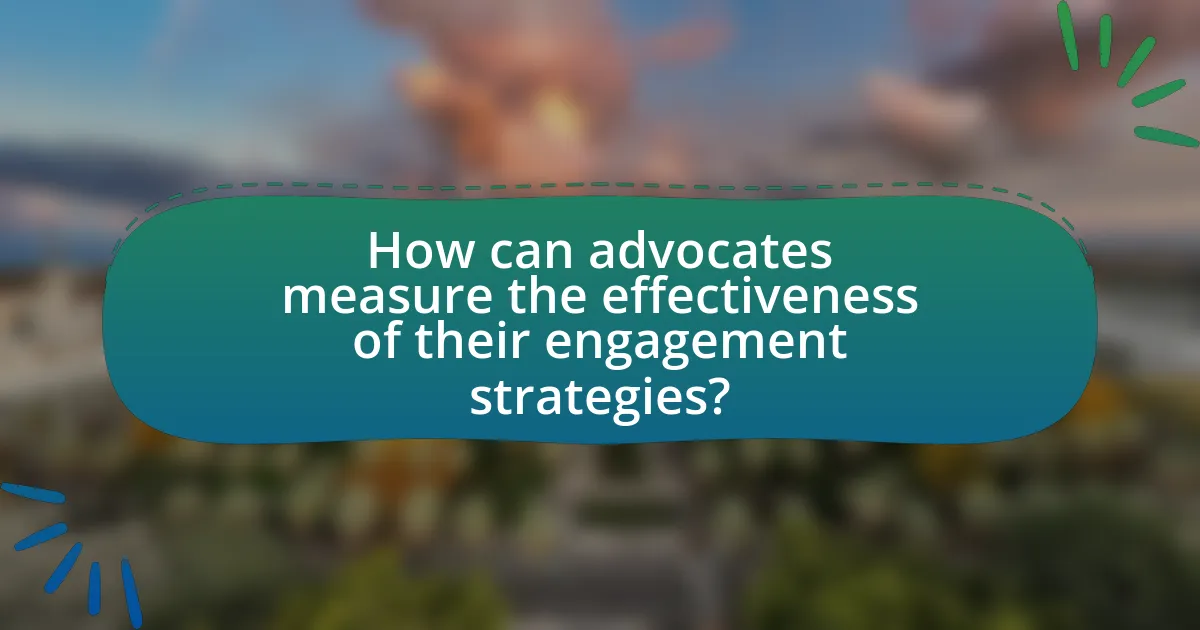
How can advocates measure the effectiveness of their engagement strategies?
Advocates can measure the effectiveness of their engagement strategies by analyzing specific metrics such as changes in policy outcomes, levels of stakeholder participation, and feedback from lawmakers. For instance, tracking the number of meetings held with legislators and the subsequent legislative actions taken can provide direct evidence of influence. Additionally, surveys conducted with lawmakers can yield insights into their perceptions of advocacy efforts, revealing whether advocates’ messages resonate and lead to actionable changes. Data from organizations like the National Conference of State Legislatures indicates that effective advocacy often correlates with increased legislative support for proposed tax reforms, demonstrating a tangible link between engagement strategies and policy outcomes.
What metrics can be used to evaluate engagement success?
Metrics used to evaluate engagement success include response rates, meeting frequency, and follow-up actions taken by lawmakers. Response rates indicate how many lawmakers engage with outreach efforts, while meeting frequency measures the number of interactions over a specific period. Follow-up actions, such as co-sponsoring legislation or providing public statements, reflect the effectiveness of the engagement strategy. These metrics provide quantifiable data that can be analyzed to assess the impact of engagement efforts on lawmakers regarding tax issues.
How can feedback from lawmakers inform future engagement efforts?
Feedback from lawmakers can inform future engagement efforts by providing insights into their priorities, concerns, and the effectiveness of current strategies. This feedback allows organizations to tailor their communication and advocacy efforts to align with lawmakers’ interests, thereby increasing the likelihood of successful engagement. For instance, if lawmakers express a need for more data on tax impacts, organizations can adjust their outreach to include relevant statistics and case studies, enhancing the relevance of their messages. Additionally, understanding lawmakers’ feedback can help identify gaps in knowledge or misconceptions that can be addressed in future discussions, ultimately fostering stronger relationships and more effective advocacy on tax issues.
What role does public support play in measuring engagement effectiveness?
Public support is crucial in measuring engagement effectiveness as it directly reflects the level of community involvement and approval for initiatives. High public support indicates that engagement strategies resonate with constituents, thereby enhancing the legitimacy and impact of advocacy efforts. For instance, studies show that when public opinion aligns with legislative proposals, lawmakers are more likely to act favorably, as evidenced by the 2017 tax reform debates where public sentiment significantly influenced congressional decisions. Thus, quantifying public support through surveys and feedback mechanisms provides tangible metrics for assessing the success of engagement strategies in the context of tax issues.
What are some best practices for ongoing engagement with lawmakers on tax issues?
Best practices for ongoing engagement with lawmakers on tax issues include establishing regular communication, providing clear and concise information, and building relationships based on trust. Regular communication ensures that lawmakers are kept informed about tax issues and stakeholder perspectives, which can influence their decision-making. Clear and concise information helps lawmakers understand complex tax matters, making it easier for them to advocate for or against specific policies. Building relationships based on trust fosters a collaborative environment where lawmakers feel comfortable discussing tax issues and considering stakeholder input. These practices are supported by the fact that consistent engagement leads to more informed legislative outcomes, as evidenced by studies showing that lawmakers who maintain regular contact with constituents are more likely to consider their views in policy decisions.
How can advocates maintain momentum in their advocacy efforts?
Advocates can maintain momentum in their advocacy efforts by consistently engaging stakeholders and utilizing strategic communication. Regular updates and transparent communication keep supporters informed and motivated, while targeted outreach to lawmakers ensures that advocacy messages remain relevant and impactful. Research indicates that sustained engagement, such as organizing events or campaigns, can increase visibility and support for tax issues, thereby reinforcing the advocacy efforts. For example, a study by the National Council of Nonprofits highlights that ongoing advocacy initiatives lead to higher levels of legislative responsiveness, demonstrating the effectiveness of maintaining momentum through persistent engagement.
What tools and resources are available to support continuous engagement?
Tools and resources available to support continuous engagement with lawmakers on tax issues include digital communication platforms, advocacy software, and educational materials. Digital communication platforms like email and social media enable direct interaction and timely updates, fostering ongoing dialogue. Advocacy software, such as Mobilize or NationBuilder, helps organize campaigns, track engagement metrics, and manage outreach efforts effectively. Educational materials, including policy briefs and research reports, provide lawmakers with essential information, enhancing their understanding of tax issues and facilitating informed discussions. These resources collectively enhance the ability to maintain sustained engagement with lawmakers, ensuring that tax issues remain a priority in legislative agendas.
